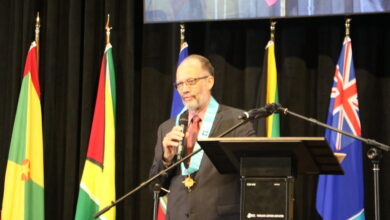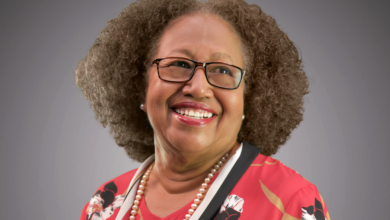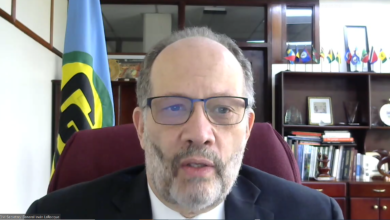Today, fourth of July, is CARICOM day. Forty-five years ago on this date, four countries signed the Treaty of Chaguaramas.
Happy CARICOM Day
As we open this Thirty-Ninth Meeting of the Conference of Heads of Government of the Caribbean Community (CARICOM), I must at the outset express my profound appreciation to the Government and people of Jamaica for the excellent hospitality extended to all of us. The arrangements put in place for the conduct of the Meeting ensure an atmosphere conducive to productive sessions here in Montego Bay which has a rich history in the integration movement.
It was here in Montego Bay in 1947, that the Conference on the Closer Association of the British West Indies rekindled the integration movement. It was here in 1997 that the decision to admit Haiti to Membership of the Community was taken and it was here in 2003 that the Rose Hall Declaration on Caribbean Community Governance was adopted.
The opportunity is with us once again to have a historic moment in Montego Bay with respect to the CARICOM Single Market and Economy (CSME).
The Community will be led over the next six months by the Most Honourable Andrew Holness, Prime Minister of Jamaica as the Chairman of Conference. I have no doubt that under his guidance, the interests of our Region will be further advanced.
I want to take this opportunity to extend thanks to His Excellency Jovenel Moise, President of Haiti for his able leadership of the Community since January.
It is my pleasure to welcome to the Conference of Heads of Government, the Honourable Mia Mottley, Prime Minister of Barbados. Prime Minister Mottley is no stranger to the Councils of the Community and is a committed regionalist who now assumes the role of the Lead Head of Government for the CSME. Prime Minister I look forward to working closely with you as we advance the CSME.
I must also congratulate the Honourable Gaston Brown, Prime Minister of Antigua and Barbuda and Dr the Rt Honourable Keith Mitchell, Prime Minister of Grenada, who both return to the Conference after victories at the polls since the last Meeting. The Honourable David Burt, Premier of Bermuda is attending his first meeting of the Heads of Government and we look forward to his fresh perspectives on the issues.
We will be welcoming to this meeting, His Excellency Miguel Díaz-Canel, the President of Cuba who will be having his first engagement with our Heads of Government continuing the fraternal relations between our countries.
We will also be welcoming His Excellency Sebastián Pinera, the President of Chile. The Community and Chile have strong relations which no doubt will be enhanced during the discussions between the Leaders.
Mr Chairman, Heads of Government, a short while ago we witnessed the swearing-in of Mr Justice Adrian Saunders as the third President of the Caribbean Court of Justice. I congratulate President Saunders on his assumption of this most important office.
The CCJ represents the essence of our independence and sovereignty and our commitment to the autonomy of the judicial system. Judges of this Court are appointed by an independent Regional Judicial and Legal Services Commission (RJLSC) after a rigorous process of recruitment. The President is appointed by the Conference on the recommendation of the RJLSC after a similar process.
It is an integral edifice in the regional architecture providing certainty and predictability in the interpretation and application of the Revised Treaty of Chaguaramas which established and governs the CSME, our platform for engineering sustainable growth and development in our Community.
Since the CSME was inaugurated here in Jamaica 12 years ago, we all agree that much has been accomplished under its regimes. But we have not achieved as much as we should have by now.
Major policy decisions and adoption of legal instruments take much too long to be negotiated. We must do more and do it more quickly. The success of the CSME is being judged, by the public, on the basis of our implementation of the measures agreed to, that allow our citizens and businesses to benefit.
This Meeting will include a Special Session on the CARICOM Single Market and Economy (CSME) to look at ways of making it more effective. That session will benefit from the views of a stakeholder consultation which I convened last month in Georgetown.
Participants at that event confirmed that the CSME remained the most viable option and platform to enable the Community and its nationals to achieve their goals of sustainable growth and development. They however pointed to areas which needed to be improved substantially.
They expressed particular concern about the ease of doing business and the movement of skilled nationals.
The participants also lamented the lack of compliance with already agreed measures. They stressed the need for an enforcement and accountability framework to encourage implementation and compliance.
It is one of the issues which features among the recommendations in the Report of the Commission to Review Jamaica’s Relations within the CARICOM and CARIFORUM Frameworks which is before this Meeting.
The views and recommendations of that Commission add a voice to the conversation on the future of CARICOM and the CSME.
On Monday in Kingston, I had a social media interaction with the Youth of the Region led by the CARICOM Youth Ambassadors. Their topic of choice was their role in advancing the CSME for which they displayed tremendous enthusiasm and eagerness to be a catalyst for improving implementation.
They also expressed their concerns with respect to issues of Mental Health and requested a regional approach just as we are doing with Non-Communicable Diseases and HIV/Aids. +The effects of climate change on the Region was another topic on which we engaged.
Mr Chairman, the vulnerability of our Member States to natural hazards and the effects of climate change remain serious challenges to our sustainable development.
This is even more so in this era of the new normal of megastorms and other highly unusual climatic events as experienced last September. It compels us to become climate resilient.
We must examine how as a Region, we can enhance the capacity to build resilience within Member States to resist the effects and recover quickly from these climatic events. Discussions on this matter were held over the last three days here in Montego Bay and a report will be presented to the Heads of Government at this meeting.
At this Meeting also the report of the Marijuana Commission will be presented for consideration.
This independent Commission comprising of experts in the fields of law, ethics, sociology, psychiatry, medical and social research, and criminology looked in depth at the social, economic, health and legal issues surrounding marijuana use. It is a topic that is engaging societies globally and this Report provides an opportunity for a reasoned discourse not only among our leaders but the entire Community.
I must thank the Commissioners led by Professor Rose-Marie Belle Antoine for their dedication to the task and the considerable amount of work they undertook. The Commission conducted consultations in Member States, receiving a wide spectrum of views. These were distilled into recommendations on issues such as decriminalisation, medical use, its listing as a controlled substance and advice against recreational use by children and adolescents. It must be noted that medical marijuana presents an economic opportunity for our Region.
Mr Chairman, Heads of Government, you have before you over the next two days, matters which, if we can conclude on, will have a significant impact on the direction of our Community. I close by endorsing to you the words of the Golding Commission as our guide: “the value of regional integration, notwithstanding the current wave of economic nationalism in various parts of the world, is as relevant and useful and, perhaps, even more urgent today than it was at its inception and can provide us a more secure passage to a brighter future than each of us trying to row his boat alone.”
I thank you.
Press ReleasesSpeeches
Remarks, CARICOM SG, Amb. Irwin LaRocque, Opening, 39th Meeting, Conf. of Heads of Govt. of CARICOM, Jamaica, 4 July, 2018





